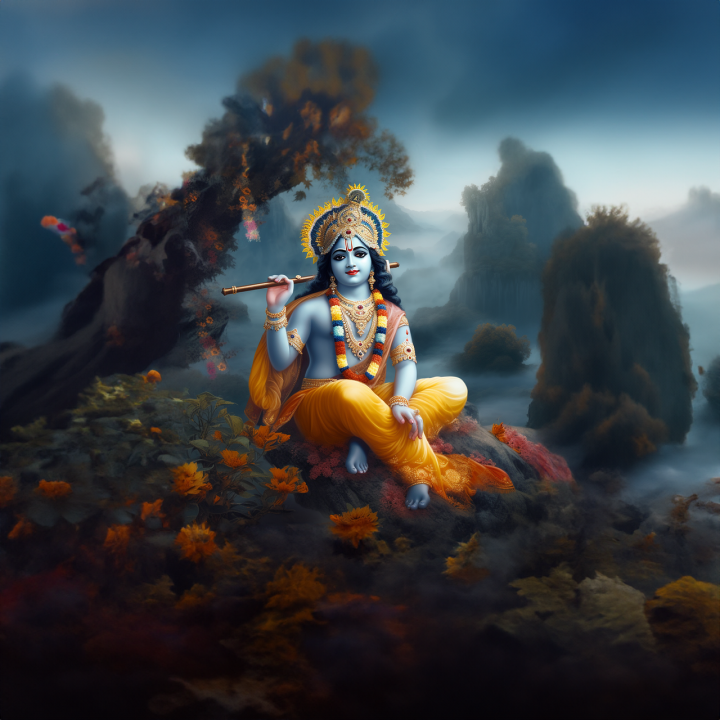
🌟 Exploring the Depths of Dharma with Shree Krishna 🌟

In the epic tales of the Mahabharata, Lord Krishna showed us the importance of doing what's right (Dharma) in many different ways. Let's take a closer look at a few of these meaningful moments:
Context no.1: Was Krishna incompetent against Jarasandha, so had to escape the battle-field?
Certainly not. In fact, Krishna and Balarama defeated Jarasandha 18 times. However, the specific reason for not killing Jarasandha was tied to a vow made by Bhima, one of the Pandava brothers. According to the Mahabharata, Bhima had taken a vow to kill Jarasandha in combat, which he ultimately fulfilled. However, Lord Krishna and the Pandavas, respecting Bhima's vow, chose not to kill Jarasandha themselves but instead arranged a wrestling match where Bhima defeated Jarasandha in a fair fight. This allowed Bhima to uphold his vow without Lord Krishna directly taking Jarasandha's life."
Core Value - Dharma (Righteousness): Even when fully capable, one should never claim someone else's credit or honor as their own.
Context no.2: Was Krishna forbidding his own vow to not raise a weapon in the war?
Never, The main reason for this was the intense battle between Bhishma and Arjuna. Although Arjuna was highly skilled and powerful, he was not fighting seriously because his heart was not in it to harm his beloved grandsire Bhishma. Bhishma fired arrows that injured both Arjuna and Krishna. This angered Krishna, who had already vowed not to raise a weapon in the war. He lifted a chariot wheel and threatened Bhishma. Arjuna stopped Lord Krishna by convincing him to return to the chariot and put down the wheel, promising to fight with all his might and stop Bhishma. Thus, Bhishma fulfilled his vow of forcing Krishna to raise a weapon. Then Arjuna used stronger weapons, injuring Bhishma.
On a side note, Shri Krishna did this because His main purpose was not to be known as someone who keeps his vow, but to establish dharma, as He had stated to Arjuna in the Gita (4.7-8). So, when He saw that the side of dharma was facing trouble in the battle, He had to interfere anyway. Also, He might have done it to please Bhishma, who too was his devotee as Arjun was.
It was also a signal to Bhishma that as a great and noble person, when your entire lineage is near its end, one should not prioritize his vows over righteousness (dharma).
Core Value - Dharma (Righteousness): There is always a righteous way hidden to manage a conflict situations.
Context no.3: Was Krishna's end not righteous?
The submergence of Dwarka and Lord Krishna's death are not directly linked to Gandhari's curse in Hindu mythology. These events are described separately:
1. Dwarka's Submergence: Dwarka, the legendary city ruled by Lord Krishna, is said to have submerged into the sea after Lord Krishna's departure from the mortal world. This event is typically attributed to the natural course of time and cosmic cycles rather than Gandhari's curse. It signifies the end of Lord Krishna's earthly presence and the return of Dwarka to the ocean, from where it was believed to have originally emerged.
Krishna's Death: Lord Krishna's death is primarily attributed to an arrow wound he received after the Mahabharata war. This incident is narrated in various versions of the Mahabharata. A hunter named Jara accidentally shot an arrow, which struck Krishna's foot, as He had taken an avatar of a human and being mortal, had to leave the form of His body as per the laws of nature.
2. Gandhari's curse: It was a significant event in the Mahabharata, was directed toward the Yadava clan and foretold their eventual destruction due to internal conflicts, but it was not directly connected to the submergence of Dwarka or Lord Krishna's death. These events are part of Hindu mythology and are interpreted symbolically and spiritually within the context of Hindu beliefs.
Core Value - Dharma (Righteousness): Krishna teaches to never support false favoritism over righteousness, and apart from that, He never disrespects anyone's sentiments, even if they are those of His enemy.
यतो धर्मस्ततो जयः
"Where there is Dharma (Righteousness), there is Jaya (Victory)."
!!! HAPPY JANMASTAMI !!! (Birth of Shree Krishna)
#Janmastami #LordKrishna #Dharma #Righteousness #Mahabharata #Wisdom #Values #InnerPeace